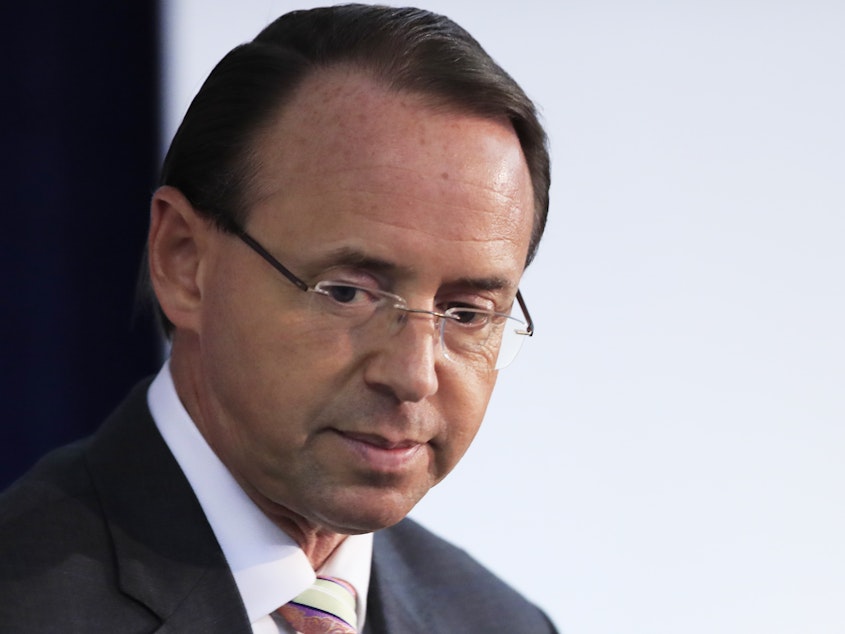Rosenstein, Expecting To Be Fired, Heads To White House For Meeting On Tense Morning

Updated at 11:56 a.m. ET
Deputy Attorney General Rod Rosenstein expects to be fired following the reports about his early tenure within the Justice Department — but had not actually stepped down as he traveled to the White House on Monday morning for a meeting.
A source close to Rosenstein said he believes he will lose his job following the New York Times report on Friday that described him discussing secretly recording President Trump and enlisting other Cabinet officers to remove Trump from power under the 25th Amendment in the spring of 2017.
Rosenstein twice denied the report.
Some news organizations reported that Rosenstein had submitted a verbal resignation to White House officials. The situation was confused and unclear.
Trump was not at the White House; he traveled to New York City for the United Nations General Assembly.
The implications
The nature of any departure by Rosenstein is important; if were to resign, federal law countenances Trump replacing him on an interim basis with another Senate-confirmed leader.
If Rosenstein were to make clear to Trump that he will not step down and that Trump must exert himself in order to terminate him, that makes it more complicated to install another deputy attorney general quickly.
One big immediate question that would be raised no matter how Rosenstein left the Justice Department is who would take charge of the special counsel investigation, or whether Trump might try separately to end or constrain it.
The wire
Months of political sandblasting came to a sudden flashpoint on Friday in the Times story, which described the atmosphere of chaos inside the government after Trump fired then-FBI Director James Comey in May 2017.
As the leaders of the Justice Department scrambled to respond, Rosenstein reportedly suggested that FBI leaders interviewing to replace Comey should wear a recording device and secretly capture their conversations with the president, according to The Times.
Subsequent reports then suggested that Rosenstein was being facetious.
His statement didn't deny that he'd had the discussions, only that he never acted on whatever was discussed.
"I never pursued or authorized recording the president and any suggestion that I have ever advocated for the removal of the president is absolutely false," Rostenstein said.
Trump appears to have taken the stories seriously; he said at a political rally that there remained a "lingering stench" to be removed from the Justice Department even after all the earlier removals there.
Face of the Russia investigation
It was Rosenstein, to Trump's frustration, who appointed Justice Department special counsel Robert Mueller after Trump fired Comey.
And it has been Rosenstein, in place of a reticent, camera-averse Mueller, who has conducted the major press briefings and made the visits to Capitol Hill since then.
Rosenstein also drew the ire of Trump and his allies when it emerged that he had signed the final application for surveillance on Trump's onetime junior campaign aide, Carter Page.
Rosenstein was one of two Justice Department officials who continued to request that surveillance even after Trump's inauguration, which suggested that it was yielding valid foreign intelligence.
For the president and his supporters, especially House Republicans on the Judiciary and intelligence committees, that meant putting a bull's eye on Rosenstein. Trump and his supporters argue the Justice Department has run amok with "bias" and abuse of power, which they say includes inappropriate snooping on Trump's campaign in 2016.
Rosenstein has defended himself and the work of federal law enforcement, but he has been fighting a months-long rearguard action against criticism by the president and House Republicans.
Intelligence committee chairman Devin Nunes, R-Calif., and Judiciary Committee members including Jim Jordan, R-Ohio, accuse Rosenstein of stonewalling and foot-dragging congressional requests for information about the Russia investigation.
They've complained about the FBI's surveillance of Page and its use of a confidential human source in 2016, who met and talked with a few Trump campaign workers as the FBI sought to investigate the "active measures" that Russia had directed against the United States.
Through it all, however, Mueller's office and the Justice Department have steadily added to the tally of criminal charges involving Russian operatives or onetime close associates of Trump.
Trump's former longtime fixer and attorney, his onetime campaign chairman, vice chairman, national security adviser and others have pleaded guilty or been convicted, although so far no one has been charged with conspiring directly with the Russian attack on the 2016 election. [Copyright 2018 NPR]



